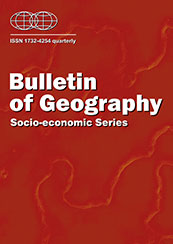Spatial polarity and spatial polarization in the context of supranational and national scales: regions of Visegrad countries after their accession to the EU
Spatial polarity and spatial polarization in the context of supranational and national scales: regions of Visegrad countries after their accession to the EU
Author(s): René Matlovič, Radoslav Klamár, Ján Kozoň, Monika Ivanová, Miloslav MichalkoSubject(s): National Economy, Supranational / Global Economy, Economic development, EU-Approach / EU-Accession / EU-Development
Published by: Wydawnictwo Naukowe Uniwersytetu Mikołaja Kopernika
Keywords: core-periphery; metropolitan gradient; spatial polarity; Visegrad countries; West–East gradient;
Summary/Abstract: The paper focuses on the evaluation of some aspects of the spatial organization of economic development of regions in the V4 countries after their accession to the EU. It focuses on the confirmation or confutation of the application of two principles of spatial organization based on the context of polarization theories, namely the polarity between western and eastern regions (i.e. the West– East gradient) and the polarity between the capital and other regions of the country (i.e. the national metropolitan gradient) at national and supranational levels. In the evaluation of the spatial polarity, the remoteness of various regions of the V4 countries from the economic core area (the Blue Banana, respectively the capital of the country) acts as the independent variable, whereby two economic indicators, i.e. the average monthly wage and the unemployment rate were chosen as the dependent variables. The analysis showed that on the supranational scale of the research in the monitored period, the increase of spatial polarisation was recorded. The increasing role of the West–East gradient and declining role of the national metropolitan gradient in the dynamics of spatial polarity has also been confirmed. The analysis has not confirmed the scale shift of polarity according to the West–East gradient to the national level, but at the same time it has pointed out the significant influence of the national metropolitan gradient in Slovakia, the Czech Republic and Hungary at this assessment level.
Journal: Bulletin of Geography. Socio-economic Series
- Issue Year: 2018
- Issue No: 41
- Page Range: 59-78
- Page Count: 20
- Language: English

